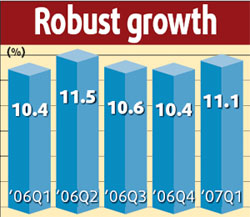| Home / Business / Real Estate | Tools: Save | Print | E-mail | Most Read | Comment |
| Property Price Rises Spread to Lower Tiers |
| Adjust font size: |
Beihai, a small city at the southern end of Prices in April alone rose 23.6 percent year-on-year, far exceeding the 11.3 percent jump of Shenzhen and 10.7 percent rise in Soaring prices are partly due to increasing movements by property developers into second-tier cities, said an industry analyst who declined to be named. Due to comparatively low land prices and little competition, Chinese real estate firms, as well as foreign investors, all quickened their expansion into secondary cities beginning last year. Yet according to Pan Shiyi, chairman of SOHO China, surging property prices in second-tier cities have been mainly driven by rising local economies and demand. "Property developers' expansion, in fact, increased the supply on the local market, which should be good news for the balance between supply and demand," Pan told China Daily. Robert Lie, CEO of ING Real Estate Investment Management Asia, said his company is optimistic about economic prospects in those locales, with second-tier cities part of their strategic focus this year due to a demand he says will grow at an average of five million apartments each year by 2015. Lian Younong, mayor of Beihai, said on June 27 that soaring property prices in the city were due to a strong economy rather than a growing bubble in the sector. Beihai's property prices, he said, will continue to rise in the future. Along with second-tier cities, the municipalities of Statistics from the Beijing Real Estate Transaction Management website show that the average cost for new residential buildings in the capital jumped by 20.4 percent in June compared with the previous month, hitting 10,280 yuan per square meter. Shenzhen also experienced growth of over 30 percent over the past two months, with the average price now exceeding 20,000 yuan per square meter in the urban area of Guan'nei. According to the NDRC, property prices among Although speculative buying and unwillingness by property developers to sell are partly fueling rising property prices, demand still exceeds supply and remains the major cause for continued price increases, experts say. A report from the central bank shows that total floor space of newly built residential buildings in the first four months this year was almost double that for the same period the year previous. The vacancy rate also dropped by 0.8 percent on a yearly basis. As the government has taken a range of restraining measures on the property sector since 2003, supply in the market has been gradually dropping. Yet excess liquidity remains and other investment channels are still limited, encouraging investment-oriented property purchases and adding upward pressure on prices, said Gu Yunchang, deputy director of China Real Estate and Building Research Institution. "The striking feature about the property sector is that its supply elasticity is quite low, but its demand elasticity is high," Gu explained. "The sales of newly built properties exceeding the existing ones implies a further restrained relationship between supply and demand." Gu's viewpoint is echoed by Pan Shiyi, who also believes demand outstripping supply remains the key trigger for this round of property price hikes. "It usually takes property developers 18 to 20 months to turn land into sellable houses, so the government's restraining measures on land supplies in the past two years partly led to the shrinking supply of finished housing this year," Pan said. According to Tian Yuan, vice-president of Guangzhou-based Hongyu Group, The recently fluctuating stock market has also encouraged some investors to turn their sights back to the property sector, a comparatively stable investment channel. "We've noticed the phenomenon among some of our clients," said Tian. (
|
| Tools: Save | Print | E-mail | Most Read |
| Comment |
 |
| Related Stories |
|
|
